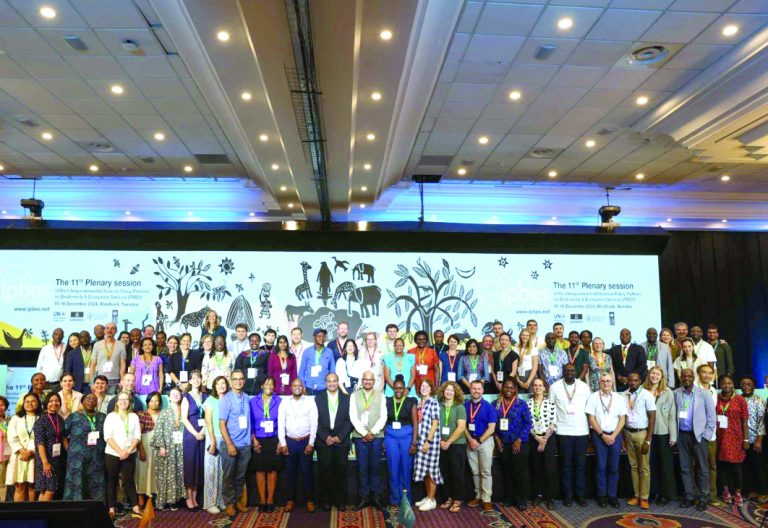Scientists grim warning to save planet in peril
By Alberto.Leny, December 20, 2024People in all countries of the world must take urgent action to halt and reverse biodiversity loss and safeguard the Earth, a landmark new scientific report launched yesterday warns.
The report, released by the world’s leading scientific experts on biodiversity during the eleventh session of the Intergovernmental Platform on Biodiversity and Ecosystem Services (IPBES) in Windhoek, Namibia on Tuesday, reveals that the planet is in peril.
IPBES is an independent intergovernmental body comprising governments and many NGOs, which provides policymakers with objective scientific assessments and knowledge regarding the planet’s biodiversity and ecosystems.
The IPBES Assessment Report on the Underlying Causes of Biodiversity Loss and the Determinants of Transformative Change and options for Achieving the 2050 Vision for Biodiversity– is also known as the Transformative Change Report. The report builds on the 2019 IPBES Global Assessment Report.
The Transformative Change Report was prepared by more than 100 leading experts from 42 countries from all regions of the world, the report explains what transformative change is, how it occurs, and how to accelerate for a just and sustainable world.
“Under current trends, there is a serious risk of crossing several irreversible biophysical tipping points including die-off of low altitude coral reefs, die back from the Amazon forest and loss of the Greenland and West Antarctic ice sheets,” the report warns.
Scientific experts estimate that acting immediately could generate $10 trillion in business opportunity value and support 395 million jobs by 2030.
The cost of delaying actions to halt and reverse biodiversity loss and nature’s decline around the world by even a decade is estimated to be double that of acting now. Acting immediately can also unlock massive business and innovation opportunities through sustainable economic approaches such as a nature-positive economy and Mother-Earth centric economy.
Approved by the IPBES Plenary, composed of the 147 member-governments, the report defines transformative change as fundamental system-wide shifts from ways of thinking, knowing and seeing structures to ways of organising, regulating and governing, and practices.
Cascading shifts
Current dominant configurations of views, structures and practices perpetuate and reinforce the underlying causes of biodiversity loss and natures decline. Transforming them is central to delivering on the global commitments for a just and sustainable world.
“Promoting and accelerating transformative change is essential to meeting the 23 action-oriented targets of the Kunming-Montreal Global Biodiversity Framework (KMBGF) by 2030 and four goals of the KMBGF by 2030 and for achieving the 2050 Vision for Biodiversity, which describes a world where all life can thrive,” says Prof Arun Agrawal, who together with Prof Karen O’Brien and Prof Lucas Garibaldi, chaired the assessment.
He noted that transformative change is rarely the outcome of a single event, driver, or actor as they are changes that each create multiple cascading shifts that trigger and reinforce one another, and often in unexpected ways.
The underlying cause of biodiversity loss identified by the report is the disconnection of people from nature and domination over nature and other people. There is also the inequitable concentration of power and wealth and the prioritisation of short-term individual and material gains. “As complex and challenging as it is to address these underlying causes of biodiversity loss, it is possible,” says Gribaldi, adding that history has shown societies can transform at immense scale – as they did during Industrial Revolution.
He asserts that to meet its shared development goals today means that humanity needs to embark on a new transformation, one that urgently conserves and restores our planet’s biodiversity rather than depleting it.
The authors of the Transformative Change Report created and analysed a database of hundreds of case studies of initiatives across the world with transformative potential.
Four principles are identified in the report to guide deliberate transformative change; equity and justice, pluralism and inclusion, respectful and reciprocal human-nature relationships, and adaptive learning and action.
“The impacts of actions and resources devoted to blocking transformative change, for example through lobbying by vested interest groups or corruption, currently overshadow those devoted to the conservation and sustainable use of biodiversity,” Prof O’Brien noted, speaking of the obstacles that prevent transformative change and reinforce the status quo.
The report also identifies five overarching challenges to transformative change including relations of domination over nature and people, especially those that emerged and were propagated in colonial eras and that persist over time, economic and political inequalities and inadequate policies and unfit institutions.
The other challenges are unsustainable consumption and production patterns including individual habits and practices, as well as access to clean technologies and uncoordinated knowledge and innovation systems.
“The underlying causes of biodiversity loss and natures decline also create inequalities and injustices,” Prof Agrawal asserted, adding that those who have benefited most from economic activities associated with damage to nature – in particular wealthy actors – have more opportunities and resources to create change.
Embracing insights and evidence from diverse knowledge systems, disciplines and approaches, the Transformative Change Report highlights five strategies and associated actions that countries and people can pursue to advance deliberate transformative change for global sustainability.
